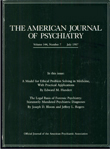Olanzapine Compared With Chlorpromazine in Treatment-Resistant Schizophrenia
Abstract
OBJECTIVE: The purpose of this study was to compare the efficacy of olanzapine with that of chlorpromazine plus benztropine in patients with treatment-resistant schizophrenia. METHOD: One hundred three previously treatment-resistant patients with schizophrenia diagnosed according to the DSM-III-R criteria were given a prospective 6-week trial of 10–40 mg/day of haloperidol. Eighty-four of them failed to respond to that trial and agreed to be randomly assigned to an 8-week fixed-dose trial of either 25 mg/day of olanzapine alone or 1200 mg/day of chlorpromazine plus 4 mg/day of benztropine mesylate. RESULTS: Fifty-nine (70%) of the 84 subjects completed the trial. The primary outcome measures were Brief Psychiatric Rating Scale total score and positive symptom score, Scale for the Assessment of Negative Symptoms global score, and Clinical Global Impression score. An analysis of variance for the subjects who completed the study showed no difference in efficacy between the two drugs. Seven percent of the olanzapine-treated patients responded according to a priori criteria; no chlorpromazine-treated patients responded. The olanzapine-treated patients had fewer motor and cardiovascular side effects than the chlorpromazine-treated patients. Extrapyramidal symptoms and akathisia were similar in the two groups, although no antiparkinsonian drugs were used in the olanzapine group. CONCLUSIONS: Olanzapine and chlorpromazine showed similar efficacy, and the total amount of improvement with either drug was modest. Olanzapine-treated patients had fewer side effects than chlorpromazine-treated patients. (Am J Psychiatry 1998; 155:914–920)



